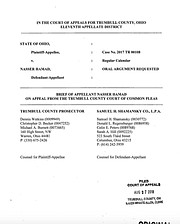Hamad appeal: Judge’s own words support lesser charges
By ED RUNYAN
runyan@vindy.com
WARREN
Attorneys for Nasser Hamad say the judge’s own words during sentencing of the Howland man show why jurors should have been instructed on two lesser charges of voluntary manslaughter.
Hamad Appeal
Attorneys for Nasser Hamad say the judge’s own words during sentencing of the Howland man show why jurors should have been instructed on two lesser charges of voluntary manslaughter.
Hamad, 49, of state Route 46, was sentenced to 36 years to life in prison Nov. 8 after jurors found him guilty of two counts of aggravated murder and several counts of attempted aggravated murder.
But Judge Ronald Rice of Trumbull County Common Pleas court told Hamad before sentencing him that Hamad “shot five people in a fit of rage because you were assaulted.”
Atty. Samuel Shamansky said in an 11th District Court of Appeals filing Monday that those words are similar to how Ohio describes the lesser offense of voluntary manslaughter. Each count of that offense carries a penalty of up to 11 years in prison but not a life prison sentence.
Voluntary manslaughter is when someone “under the influence of sudden passion or in a sudden fit or rage, either of which is brought on by serious provocation occasioned by the victim ... shall cause the death of another.”
Hamad’s trial attorneys asked Judge Rice instruct jurors they could find him guilty of voluntary manslaughter instead of aggravated murder, but the judge refused.
The filing calls that one of four errors Judge Rice made, and it says they are reasons Hamad’s conviction and sentence should be overturned.
Hamad shot and killed two young men – Joshua Haber, 19, and Josh Williams, 20 – and injured three other people who came to his house on state Route 46 near the Eastwood Mall Feb. 25, 2017, as part of an ongoing feud.
Before Hamad started shooting, one of the five, John Shively, then 17, and his mother, April Trent Vokes, then 42, confronted Hamad in Hamad’s front yard, which resulted in a fist fight between Hamad and Shively.
But three other males jumped out of their vehicle near the road joined the fight, assaulting Hamad. After Hamad got free, he went in his house, got a gun, and started firing at the group, which was in or near their vehicle.
When Hamad’s ammunition ran out, he went back inside for more bullets, returned to the van and continued firing. Shively was not seriously hurt, but his mother and Bryce Hendrickson, 19,, suffered serious injuries.
The filing also challenges the judge’s decision to refuse to bar an expert witness hired by Hamad, to testify at the trial that Hamad was suffering from post traumatic stress disorder and a concussion at the time he shot the five.
The testimony would have bolstered Hamad’s self-defense claim and refuted prosecutors’ contention that Hamad acted with prior calculation and design, the filing says.
The fiing says that under Ohio law, “A defendant asserting self defense must [establish] that [he or she] had ‘a bona fide belief that [he or she] was in imminent danger of death or great bodily harm and that his only means of escape from such danger was the use of such force.’”
The filing acknowledges that the cases it cites were cases involving women and children, but it compared Hamad’s mindset at the time of the shootings to a military veteran with PTSD.
The filing also says the judge erred by not declaring a mistrial when a prosecutor suggested that Tracy Hendrickson, Hamad’s girlfriend, had colluded with defense attorneys to “manufacture her testimony.”
 43
43

